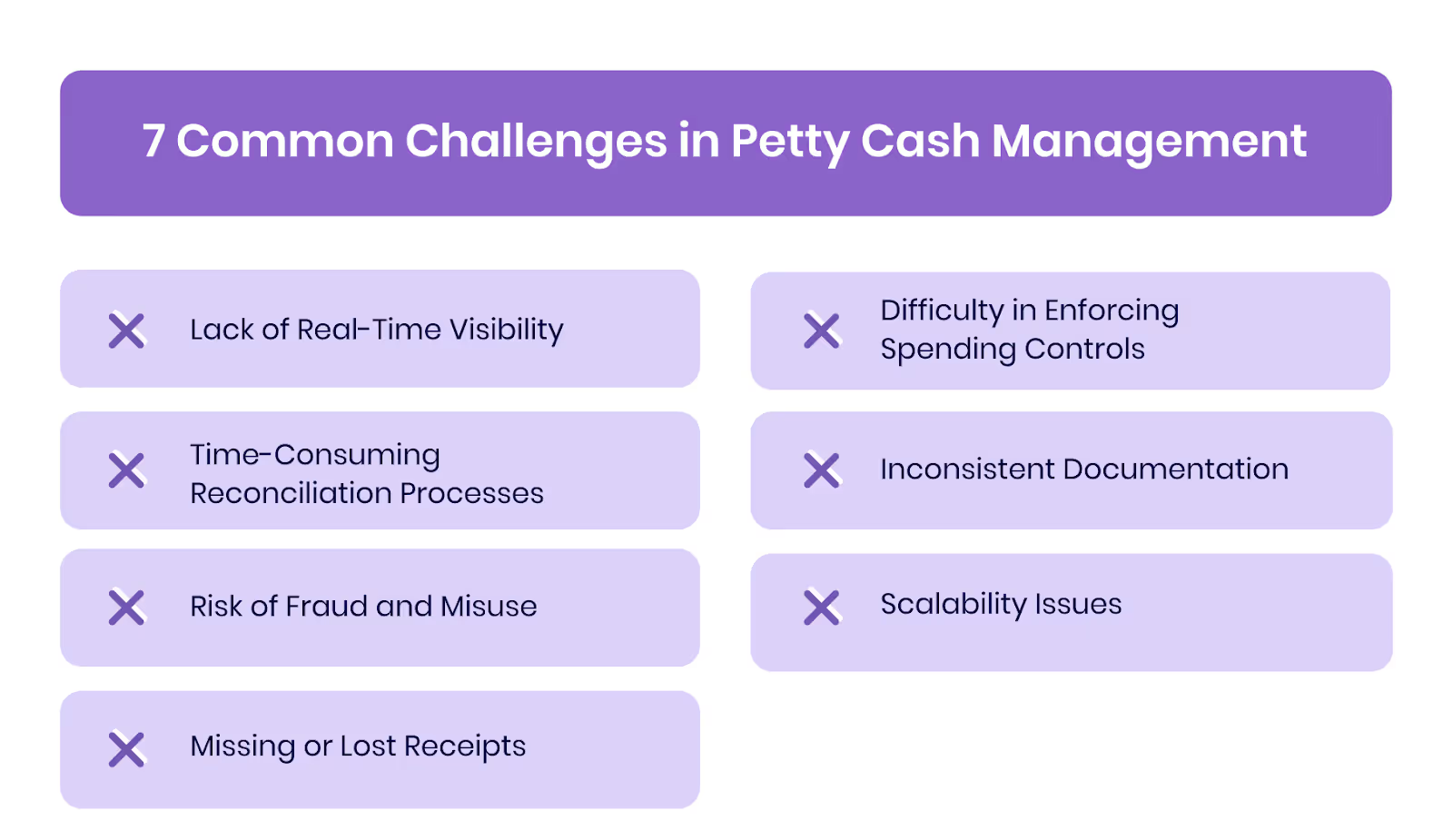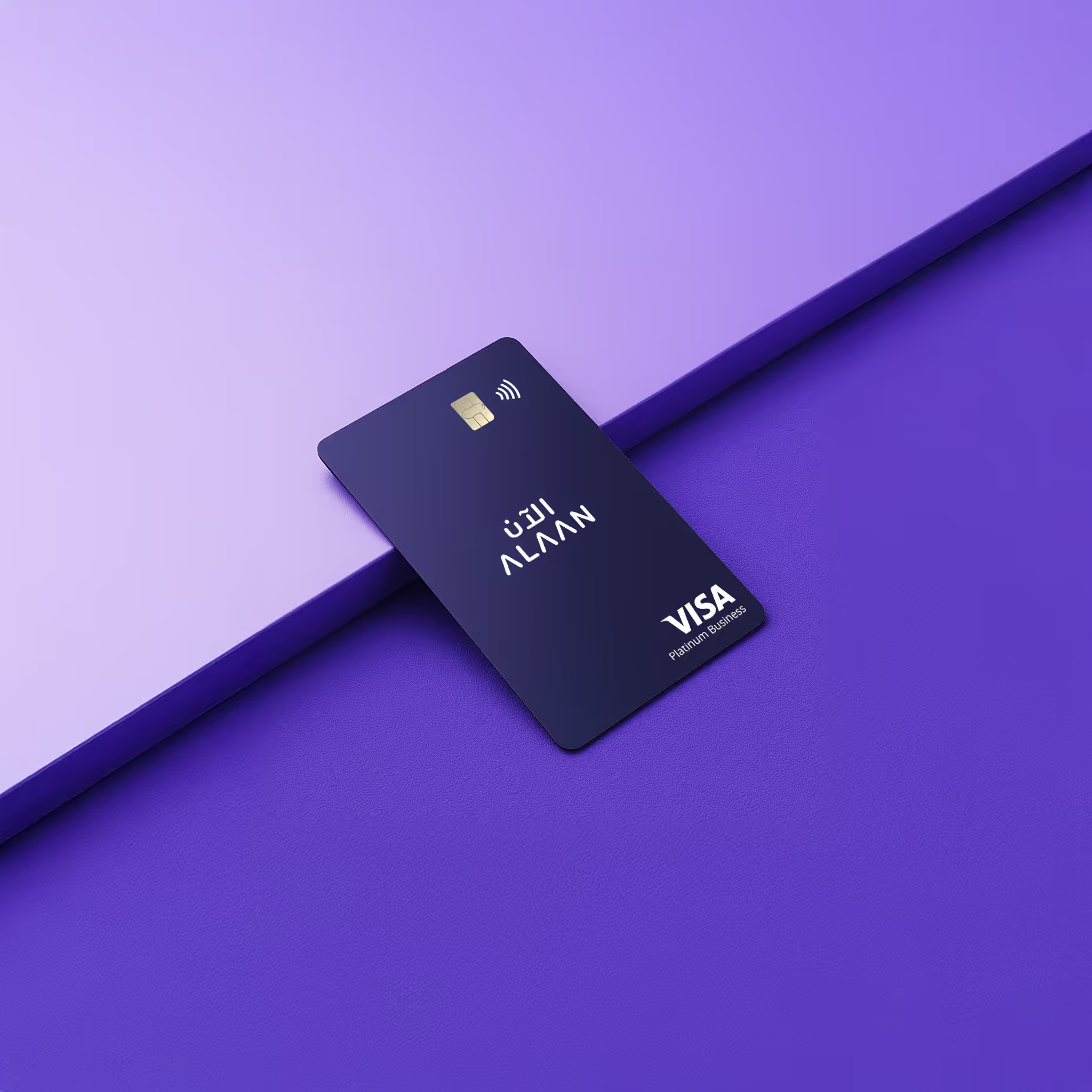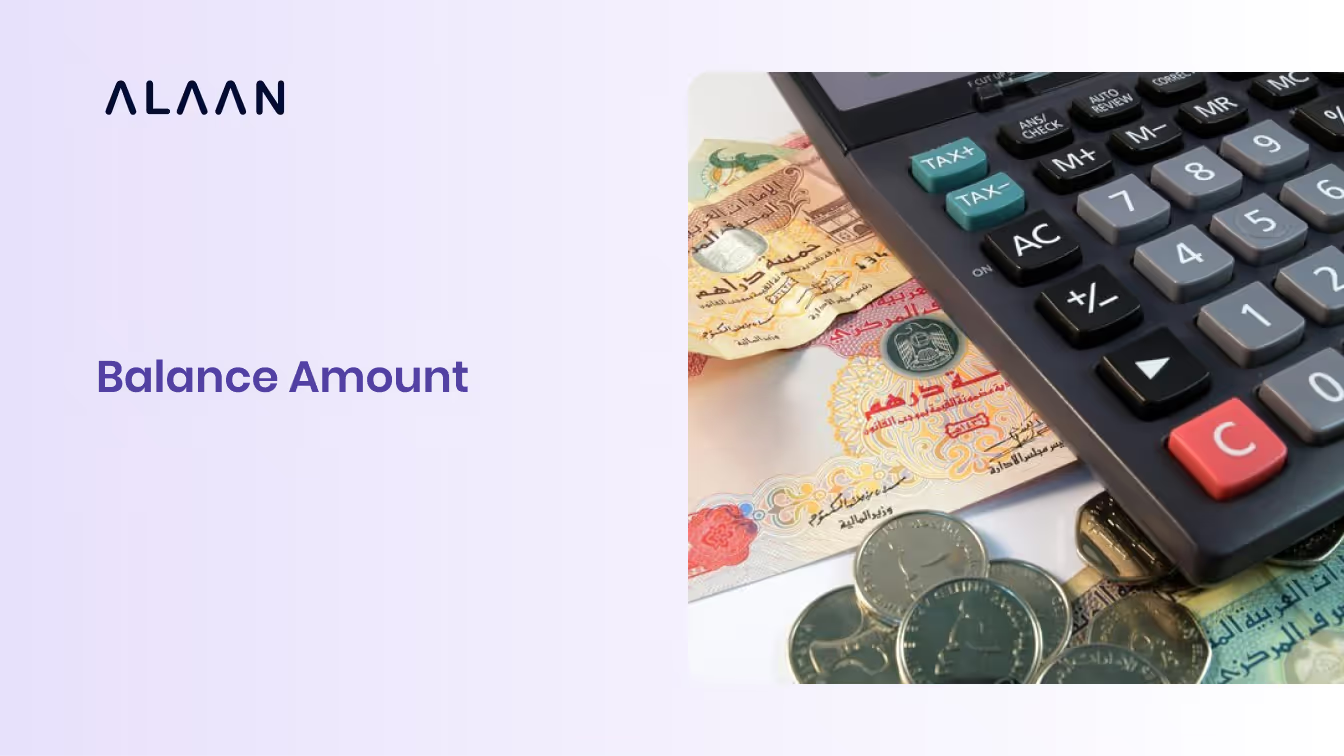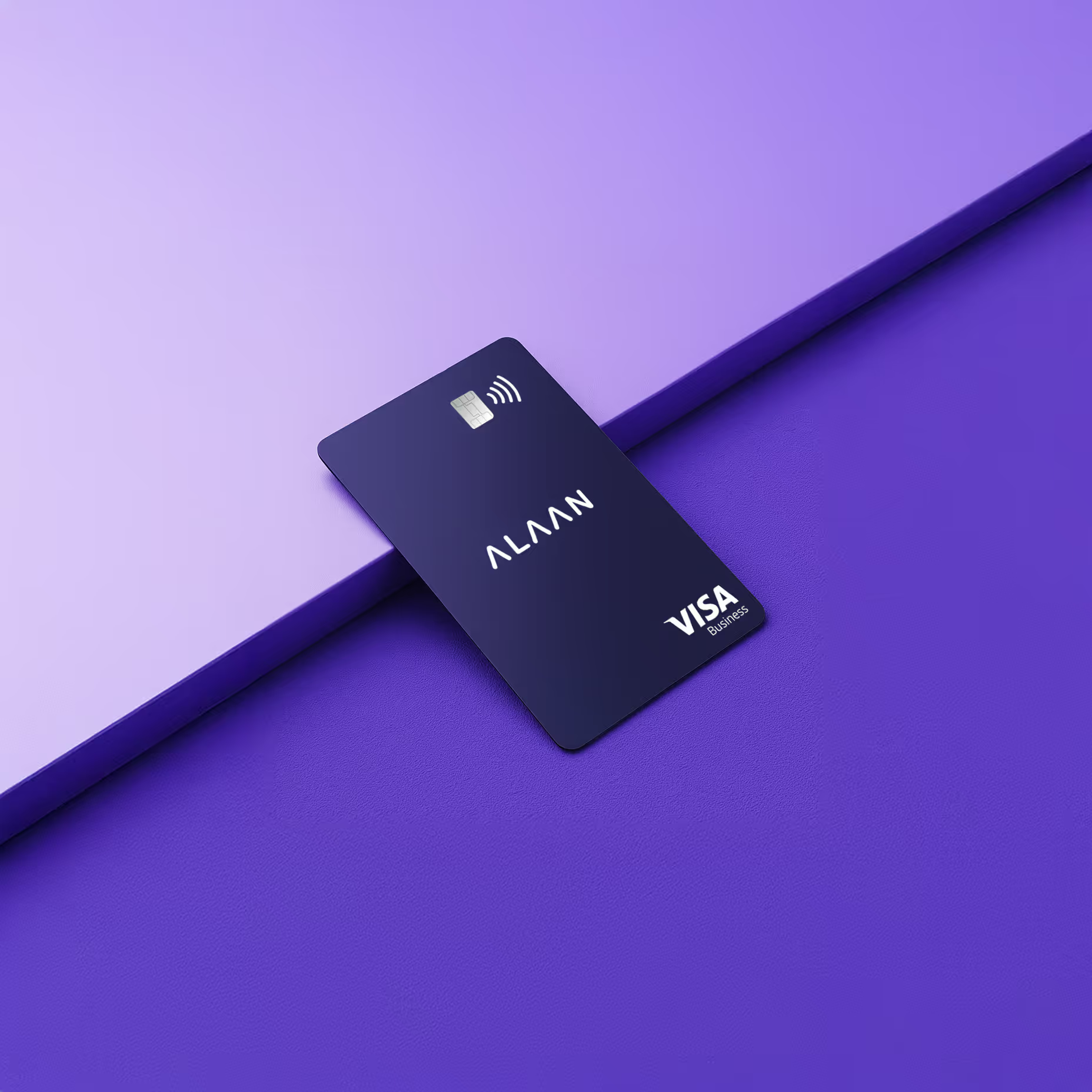Around 25% of UAE employees still rely on company petty cash for business expenses, while another 29% pay out of pocket and wait for reimbursement. At first glance, this might look manageable, but in reality, it shows how scattered and outdated expense handling still is.
As companies grow, relying on manual tracking, handling lost receipts, and reconciling discrepancies between records and bank statements often leads to inefficiencies, compliance risks, and wasted hours.
In a country where VAT compliance is strictly enforced and financial accuracy is crucial, traditional petty cash systems no longer meet the needs of modern businesses. In this blog, you'll explore petty cash challenges, compliance risks, and how UAE businesses are replacing outdated systems with smarter expense solutions.
Key Takeaways:
- UAE businesses are adopting digital solutions like corporate expense cards to optimise petty cash with real-time tracking, stronger compliance, and higher efficiency.
- Automated systems reduce manual reconciliation, saving time and improving accuracy for finance teams.
- Corporate expense cards with spending limits and vendor restrictions tighten control, minimise fraud risks, and ensure VAT and corporate tax compliance.
- Real-time visibility gives CFOs data-driven insights and better oversight of department spending.
- The shift supports the UAE’s vision for a cashless economy, driven by digital payments, AI-powered solutions, and reduced reliance on traditional petty cash.
What is Petty Cash?
Petty cash is a small reserve that businesses keep to cover minor expenses that don’t require formal financial processes. In the UAE, this often includes office supplies, local transport, employee reimbursements, or small maintenance costs.
For finance teams, petty cash supports smooth daily operations but requires careful management. A proper system ensures transparency, accurate tracking, and compliance with UAE VAT and corporate tax rules.
Without efficient processes, petty cash can lead to manual work, errors, and compliance risks, often surfacing during VAT filings or audits.
The Traditional Petty Cash System: Is It Still Relevant or Outdated?
The traditional petty cash system was once a standard for covering small, urgent expenses in UAE businesses. Cash was kept physically and used without formal processes.
Today, this approach is less effective. Manual tracking, cash handling, and reconciling records create inefficiencies that worsen as businesses scale.
In the UAE, VAT and corporate tax rules make compliance harder with manual processes. Finance teams spend more time fixing records instead of focusing on strategic work.
Although the traditional petty cash system is still in use, today’s business environment offers better ways to manage expenses, ones that are more efficient, transparent, and compliant.
Before exploring smarter solutions, let’s first examine the key challenges businesses face with petty cash management.
7 Common Challenges in Petty Cash Management

Managing petty cash comes with its own set of challenges. For CFOs and finance leaders, the main concerns often revolve around control, transparency, and compliance. Let us have a closer look at some of the key challenges companies face when dealing with petty cash.
1. Lack of Real-Time Visibility
Traditional petty cash systems rarely provide real-time insights into spending, making it hard for finance teams to track expenses accurately. This lack of visibility often results in budget misalignment, financial discrepancies, and challenges in monitoring cash flow.
Without automated tracking, finance leaders in the UAE also risk running into problems during monthly reconciliations and VAT filings.
2. Time-Consuming Reconciliation Processes
Manual reconciliation is one of the biggest pain points in petty cash management. Finance teams spend considerable time matching receipts, recording transactions, and ensuring expenses follow company policies.
Not only is this process labour-intensive, but it also increases the risk of human error, creating discrepancies in financial records.
3. Risk of Fraud and Misuse
Physical cash handling brings higher risks of fraud or misuse. Employees may misappropriate funds, intentionally or unintentionally, especially in businesses with decentralised petty cash management.
Without a structured approval and tracking system, companies expose themselves to financial losses and credibility issues.
4. Missing or Lost Receipts
Paper receipts remain the backbone of petty cash documentation, but they are often misplaced, incomplete, or lost. In the UAE, this creates significant challenges since VAT compliance requires proper documentation for every transaction.
Missing receipts can block VAT refund claims, lead to non-compliance with the UAE Federal Tax Authority (FTA), and even result in costly penalties.
5. Difficulty in Enforcing Spending Controls
Without real-time spending limits or restrictions on petty cash usage, businesses struggle to maintain budgets effectively. Employees may overspend, sometimes unintentionally, which results in budget overruns or expenses that exceed company policies. For larger organisations with multiple departments, the lack of enforceable controls only adds to the challenge.
6. Inconsistent Documentation
Manual petty cash systems make it difficult to ensure consistent documentation. Missing details or incomplete records often become problematic during audits or tax filings. For UAE businesses, where VAT compliance and audit readiness are critical, this inconsistency can lead to unnecessary complications.
7. Scalability Issues
Managing petty cash manually across multiple teams, departments, or locations becomes complex and inefficient. As operations expand, so do errors, inefficiencies, and compliance risks.
These challenges show why relying on traditional petty cash methods is no longer enough for UAE businesses.
Why UAE Businesses Need a Smarter Approach in Managing Petty Cash?
The UAE businesses are adapting to digital transformation, stricter regulations, and growing operational demands. In this environment, managing petty cash manually is no longer practical or sustainable.
Here’s why UAE businesses need to adopt smarter, more efficient approaches to petty cash management:
Adapting to the UAE’s Digital Economy
As the UAE positions itself as a digital-first economy, businesses must ensure their financial processes are upgraded with this transformation. Automated solutions make it easier to manage petty cash efficiently, offering real-time visibility into spending while freeing up finance teams to focus on more strategic work.
Meeting the Demands of Remote Work and Distributed Teams
With hybrid and remote work becoming the norm, UAE businesses are often managing teams spread across multiple locations. Smarter solutions, like virtual corporate cards and automated approvals, help ensure every team member follows company policies while maintaining centralised financial control.
UAE-Specific Compliance Requirements
The UAE’s corporate tax and VAT regulations require businesses to maintain precise financial records. Automated solutions ensure VAT compliance by offering real-time expense tracking and generating audit-ready reports that keep businesses aligned with regulations.
Enabling Faster, Data-Driven Decision-Making
Today, businesses need timely insights to make smart decisions. Digital tools provide real-time expense insights, giving finance leaders the information they need to make quick, informed decisions that drive efficiency and growth.
Reducing Administrative Overhead and Operational Costs
Managing petty cash manually places a heavy administrative burden on finance teams. Automating the process reduces manual work, cuts operational costs, and simplifies workflows, allowing businesses to direct resources toward higher-value activities.
Supporting Scalability and Business Growth
As businesses expand, their financial needs become more complex. Digital petty cash solutions scale easily, offering the flexibility and control needed to support business growth while ensuring compliance and efficiency at every stage.
Strengthening Internal Controls and Transparency
Smarter solutions improve transparency by introducing features like automated receipt capture, real-time transaction monitoring, and digital approval workflows. These tools strengthen internal controls, ensure spending aligns with company policies, and reduce the risk of fraud or unapproved expenses.
How Alaan Helps Solve Common Petty Cash Management Challenges?
Petty cash management can be tricky for businesses in the UAE. At Alaan, we enable businesses to automate petty cash management by providing real-time tracking, ensuring compliance, and reducing manual reconciliation, all in one integrated platform.
Here’s how Alaan makes petty cash management easier:
- Prepaid corporate cards with built-in controls: Alaan offers physical and virtual prepaid corporate cards that let administrators set spending limits, block vendors, and freeze cards when needed. They also work with Apple Pay and Google Pay, which makes it convenient to control petty cash.
- Automated expense capturing and receipt verification: All Alaan card transactions are logged automatically. Employees can upload receipts through the app, and Alaan’s AI uses OCR to match them with transaction data. This automates petty cash tracking, reduces manual effort, and improves accuracy.
- AI-powered verification, duplicate detection, and VAT compliance: Alaan’s AI scans receipts to categorise expenses, flag duplicates, and verify VAT details, ensuring compliance with UAE FTA regulations. This keeps petty cash records accurate, compliant, and audit-ready.
- Real-time visibility and analytics for finance teams: Finance teams gain instant visibility into petty cash transactions, making it easier to monitor spending, enforce policies, and stay on budget across departments. Real-time monitoring helps control costs and avoid overspending.
- Smooth accounting integration: Alaan integrates with QuickBooks, Xero, NetSuite, and Microsoft Dynamics, syncing expenses and receipts automatically. This ensures accurate reporting and smooth reconciliation, eliminating manual work tied to petty cash systems.
- Enhanced security and fraud protection: Prepaid cards include real-time blocking, fraud alerts, and liability insurance for unauthorised transactions. This ensures petty cash is managed securely while reducing fraud risks.
- Scalability and flexibility for growing businesses: Built to scale, Alaan offers centralised controls and flexible features that work for startups and large enterprises. Businesses can issue unlimited cards, set tailored limits, and manage petty cash efficiently as they grow.
The impact of Alaan’s solutions becomes even clearer when you look at real-life examples.
Case Study: How Dubai's Property Maintenance Company Eliminated Petty Cash by 90%?
Industry: Property Maintenance
Challenge: Inefficient petty cash management and transaction discrepancies
Solution: Alaan’s AI-powered expense management platform
Results: 90% reduction in petty cash use, improved financial transparency, and time savings
K4 Technical Services is a Dubai-based property maintenance company offering facilities management, fit-outs, renovations, and holiday home services. Backed by ISO 9001 certification and a team of 250+ professionals, K4 provides end-to-end solutions from routine maintenance to emergency repairs.
The Problem
Before Alaan, K4 faced recurring issues in expense management:
- Manual petty cash tracking led to discrepancies and inefficiencies.
- Transaction delays caused mismatches between records and bank statements.
- Limited visibility into department-level spending made budgeting difficult.
These challenges pushed K4 to seek a smarter, more transparent system.
The Solution
K4 adopted Alaan’s AI-powered expense management platform, replacing manual petty cash with automation:
- Automated receipt tracking: Reduced admin work and improved transparency.
- Real-time transaction monitoring: Provided instant visibility for accurate reporting.
- Corporate cards with controls: Custom limits and restrictions enabled efficient department-level spending.
- Cashback benefits: Earned 2% cashback on foreign currency transactions, including online advertising.
Results
With Alaan, K4 achieved measurable improvements:
- 90% reduction in petty cash use: Manual tracking replaced with card-based automation.
- Greater financial transparency: Automated receipts and real-time monitoring improved oversight.
- Smarter budgeting: Department heads gained control of faster, data-driven decisions.
At Alaan, we are proud to help businesses like K4 simplify their financial processes, ensuring they save time, reduce manual work, and improve their bottom line.
Connect with us to learn more.
The success of this company shows how petty cash management is changing across the UAE.
The Future of Petty Cash Management in the UAE
As the UAE moves closer to a cashless economy, petty cash management is being reshaped by digital transformation, regulatory initiatives, and evolving business needs. Here is a list of future trends for petty cash management in the UAE:
1. Digital Transformation and Automation
The UAE is rapidly shifting from traditional cash handling to digital payments. A Mastercard SME Confidence Index revealed that 92% of SMEs in the UAE now accept digital transactions, showing strong progress toward a cash-free ecosystem.
This shift is powered by AI, blockchain, and real-time payment systems, which improve efficiency in financial services and reduce the need for manual petty cash processes.
2. Government Initiatives and Regulatory Support
The UAE government has set ambitious goals for a cashless economy. Dubai’s Cashless Strategy aims for 90% of all transactions to be non-cash by 2026.
At the same time, the launch of the Digital Dirham, the UAE’s central bank digital currency, is designed to simplify cross-border payments and cut transaction costs, further reducing the role of physical petty cash.
3. Enhanced Financial Controls and Compliance
As digital payments become the norm, businesses are strengthening financial controls to meet compliance standards while improving transparency.
Automated systems now include measures such as segregation of duties, approval workflows, and real-time reconciliation, aligning seamlessly with the UAE’s regulatory framework.
4. Integration with Digital Payment Platforms
Cross-border payment innovation is also accelerating. The integration of India’s Unified Payments Interface (UPI) with the UAE’s AANI platform enables instant, secure transactions without the need for cash or traditional intermediaries. This collaboration highlights the UAE’s commitment to building a strong digital payment ecosystem.
5. Future Outlook
With businesses adopting digital wallets, real-time payments, and AI-driven expense management platforms, reliance on petty cash will continue to fade. These innovations simplify financial operations and enhance transparency, supporting the UAE’s long-term vision of becoming a fully cashless economy.
Also Read: How to Enter Petty Expenses Cash File in ERP
Wrapping Up
Petty cash management in the UAE comes with several challenges. As businesses grow, traditional systems can no longer keep up with the need for transparency, accuracy, and real-time tracking.
By adopting smarter, AI-powered solutions like corporate expense cards, UAE businesses can simplify financial operations, stay fully VAT-compliant, and improve overall efficiency.
c, we have built an AI-powered spend management platform to help UAE businesses take control of petty cash and expenses, without relying on spreadsheets or manual tracking. Our platform automates expense management, ensures smooth VAT compliance, and integrates with your accounting systems to reduce administrative work.
Book a quick demo today to see how Alaan can simplify expense management, give you better cash flow visibility, and save your team's valuable time.
Also Read: How to Manage Overall Spending in the UAE and GCC
FAQs
1. Can corporate expense cards be used to enforce spending controls?
Yes, corporate expense cards let administrators set per-employee spending limits, apply vendor restrictions, and track transactions in real time. This makes it easier to stick to company budgets and policies without extra manual effort.
2. How do you handle receipt management with petty cash?
Instead of chasing paper receipts, businesses can use tools that capture and store them digitally. These systems automatically match receipts with transactions, which helps prevent loss and makes VAT compliance much simpler.
3. What is the role of AI in petty cash management?
AI brings efficiency by verifying receipts, flagging duplicate expenses, and categorising transactions automatically. This ensures accuracy in financial reporting and helps businesses stay compliant while reducing manual workload.
4. Why should businesses replace manual petty cash systems?
Manual processes are slow, error-prone, and often lead to gaps in financial records. Switching to automated solutions gives businesses real-time tracking, stronger control, and much better accuracy, all of which save time and reduce compliance risks.
5. What role does petty cash management play in compliance audits?
Well-managed petty cash ensures every transaction is properly recorded and ready for audits. Automated systems make this even easier by maintaining accurate records and generating VAT-compliant reports, lowering the chances of penalties during audits.


.avif)







